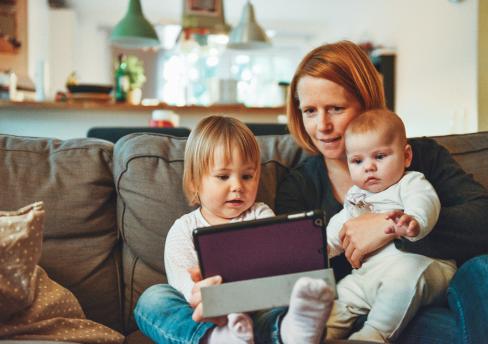Several weeks into our new reality, the only thing anyone can be certain of at the moment is that our collective situation is uncertain, and likely to remain so. It’s not clear when, or how, the current restrictions can be reshaped or relaxed, or what Scotland will look like six months or even three weeks from now.
Such uncertainty is a source of stress in its own right, adding to the pressures on families who may already be facing practical worries such as income and job security, safety at work, and the safety of elderly and vulnerable friends and relatives.
Children will also be experiencing the psychological impact of uncertainty, although they may not be able to articulate this fully. Their routines have changed; they have lost teachers, friends and relatives from their daily lives and may worry about their parents who are juggling the pressures of current life. They may express their anxiety behaviourally rather than verbally, and parents need to be able to find ways to ensure their children know they are safe and loved.
Younger children make sense of their worlds through play but have lost their friends. Older children rely on social relationships but have lost access to their peer group. Parents are also feeling stressed while trying to do the best for their families.
The solutions are not simple, but parents must acknowledge their own needs so they can be emotionally available for their families. This does not mean having big conversations about feelings. It means small things that allow personal connections. Spending time with your child engaging with their interests; board games, imaginative play, outdoor activities, watching movies, video games. These are the activities that let children make sense of their worlds and know their parents are there for them.
As well as having psychological implications, the uncertainty of pandemic life may raise legal questions. For separated families where the care of children is shared between households, lockdown may be placing a strain on these arrangements, practically and emotionally. At the time of writing, children are allowed to move between households for the purposes of seeing the other parent. If there is a court order in place regulating such contact, parents should try to stick to it, but can agree to vary it without going back to court for formal permission if they both think this is the right thing to do (e.g. if one household has a particularly vulnerable member). It is a good idea to record such an agreement in writing, even if it’s just an exchange of text messages.
Where difficulties may arise is where parents can’t agree and one parent refuses to allow the child to see the other. As with any decision about a child in Scotland, the fundamental guiding principle must be the child’s welfare; it is also important to consider the child’s own views, in line with their age and understanding. Separated parents who can’t resolve such a conflict may consider accessing videolink mediation services. Discussing the issues with the assistance of a neutral, independent third party can often help to move through a conflict and agree shared and workable solutions.
If that's not possible, or appropriate, parents may need to ask the court to intervene. Urgent applications about a child can still be made, although how they are dealt with will depend on the particular circumstances of the case. Parents involved in a court case that was put on hold at the start of lockdown can now apply to have it restarted and orders made, provided the matter can be dealt with remotely. So if it’s impossible to reach agreement, it's still worth discussing the legal options with a solicitor.
While the current uncertainty is likely to last for some time, help is at hand. Parents can access online support from charities such as Gingerbread and Children 1st, and some local authority and NHS psychology services may still be available via referral. It's also likely that the courts will further expand their use of videolink and telephone hearings in the weeks to come. Although the big issues arising from the pandemic may not be resolved quickly, we can still do a lot to support each other - and our children - to deal with uncertainty meantime.
Co - author: Dr Anne Woodhouse, Solution Psychology.
Music: Purple Planet, visit the website for more information.
The content of this webpage is for information only and is not intended to be construed as legal advice and should not be treated as a substitute for specific advice. Morton Fraser LLP accepts no responsibility for the content of any third party website to which this webpage refers. Morton Fraser LLP is authorised and regulated by the Financial Conduct Authority.









